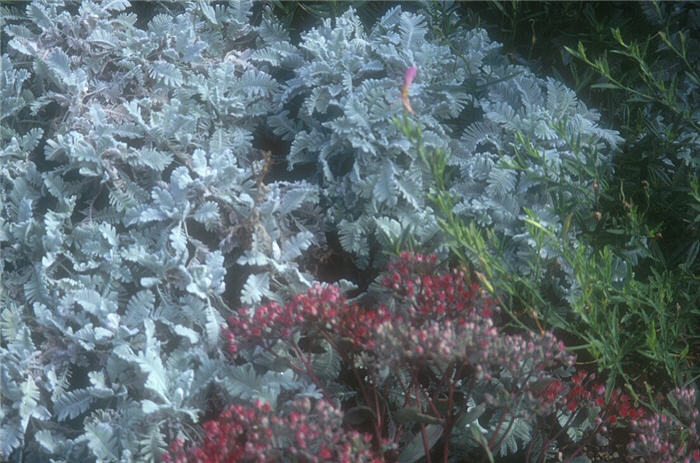| Botanical Name: Chrysanthemum ptarmiciflorum | |
| Common Name: Dusty Miller |

-
Anatomy
-
Culture
-
Design
Plant Type
Annual
Height Range
Under 1', 1-3'
Flower Color
Yellow
Flower Season
Spring, Summer, Fall
Leaf Color
Grey, Silver
Bark Color
n/a
Fruit Color
n/a
Fruit Season
n/a
Sun
Full, Half
Water
Low, Medium
Growth Rate
Moderate
Soil Type
Sandy, Clay, Loam, Rocky, Unparticular
Soil Condition
Average, Rich, Poor, Well-drained, Dry
Soil pH
Neutral, Basic
Adverse Factors
n/a
Design Styles
English Cottage, Formal, Mediterranean, Ranch, Spanish
Accenting Features
Unusual Foliage
Seasonal Interest
Summer, Fall
Location Uses
Perennial Border, Raised Planter
Special Uses
Container, Cut Flowers, Hanging Baskets
Attracts Wildlife
n/a
Information by: Stephanie Duer
Photographer:
Photographer:
-
Description
-
Notes
Another dusty miller, or the same one as those listed as centaurea, depending on which reference is used. Dusty Miller is a tender perennial, which means that generally, it isn't rated as hardy enough to withstand our winters, though it frequently manages to survive. It grows from about 6 to 12 inches tall and wide, has silvery grey foliage, and sometimes tiny button-like yellow summer flowers. Its a fine plant for containers and perennials borders, providing a bridge between blooming seasons and a pleasant foil to strong flower colors.
I have seen this plant used in nearly every location and it seems to do just fine, but ideally, it is used were there is full to part sun in well-drained soil. One contributor to a shortened life is boggy soils, especially going into the winter. If it over-winters, it will probably need a good cutting back to remove dead leaves and stems.